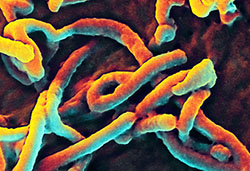 |
| Scanning electron micrograph of ebolavirus in an African green monkey kidney cell--Courtesy of NIAID |
Back in March, after being thrust into the center stage of a national media storm stirred by the parents of a desperately sick young boy, Chimerix hustled to put together a small Phase III pilot program to test its closely watched antiviral brincidofovir for adenovirus infections. Today, CEO Michelle Berrey says the company is now scrambling to put together another overnight study plan for Ebola rather than risk getting hit with a fresh round of compassionate-use demands.
"The same as adenovirus, we strongly prefer to have clinical trials" rather than provide the antiviral for individual emergency cases, says Berrey. Over the next 24 to 48 hours, she adds, Chimerix plans to hammer out a study plan for Ebola with the FDA and then follow up with officials in Europe.
Earlier this week Chimerix shares ($CMRX) jumped on the news that an Ebola patient in Dallas had been treated with brincidofovir, with physicians saying that more compassionate use cases could follow. But that's exactly the kind of case-by-case emergency use that the company has been trying to avoid for the past two years, as word of the powerful, but experimental, broad-spectrum antiviral spread.
By lining up centers for the study in Europe and the U.S. which can stock brincidofovir for use with patients who find themselves infected after returning from the hot zone in West Africa, the company can meet the demand much more efficiently, says Berrey. And the company also expects to clear the study, which can better examine the right dosage as well as the impact on side effects for Ebola patients, with the EMA and individual European countries.
"Ebola is something we don't want to walk away from given the outbreak," says the CEO. But she also doesn't want the work to distract from the company's core focus on CMV, adenovirus and smallpox. "We're not going to be the solution to the Ebola epidemic," but there's also good reason to explore how brincidofovir can be used to prevent the spread of Ebola. Currently there are no plans for the company to mount a large study in Africa.
Brincidofovir is a lipid-conjugated version of cidofovir--one of Gilead's ($GILD) IV antivirals--that's specifically designed to amp up the antiviral impact with a pill while sparing kidneys from a toxic threat. Its ability to get into cells more effectively than cidofovir has vastly improved its punch against all 5 DNA viral infections but has also raised questions about whether it could prove a threat to all rapidly growing cells, including cells in the bone marrow.
Over the past three months, the biotech's stock has gyrated up 45%.
- here's the press release